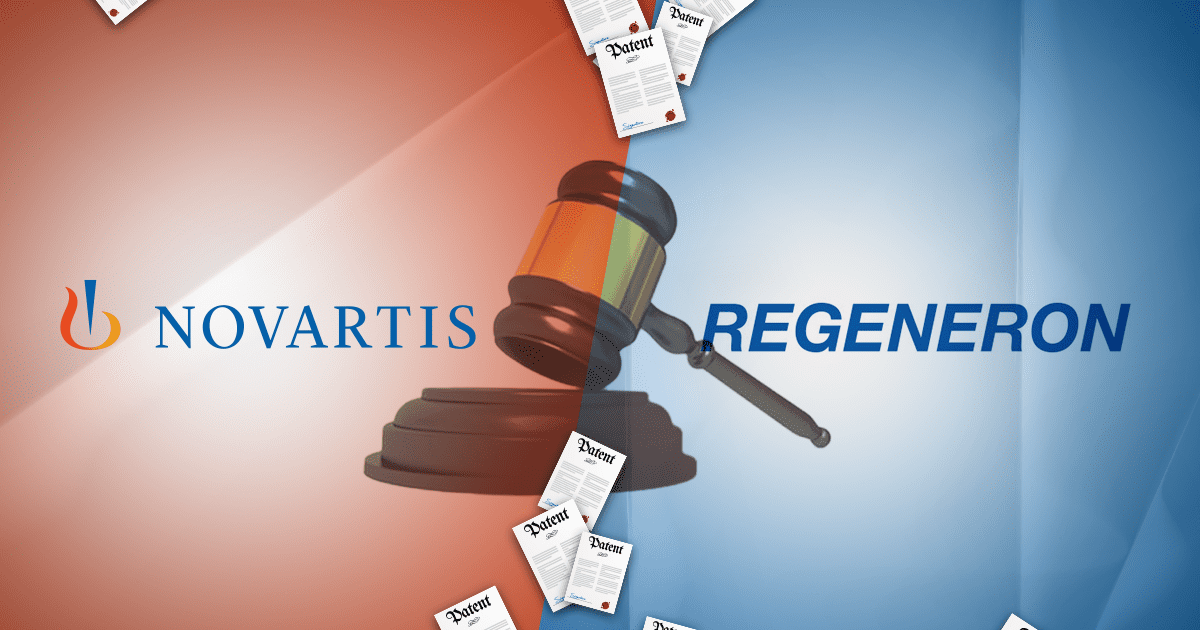Novartis-Regeneron Dispute Enters a New Phase

If you can’t beat ‘em, try to beat ‘em another way.
On the same day the US International Trade Commission (US ITC) dropped a patent infringement investigation into a Novartis complaint against rival Regeneron Pharmaceuticals, Sandoz, a Novartis division, said it would initiate enrollment in a confirmatory Phase III trial for a biosimilar candidate of Eylea, Regeneron’s anti-VEGF blockbuster.
‘Acrimonious’ Patent Dispute
It was the latest maneuver around a dispute between the two anti-VEGF giants that has them on opposite sides in two different lawsuits filed in two different federal district courts in New York State in what the news site Fierce Biopharma calls “an acrimonious patent fight.”
Novartis contends that Regeneron’s imports of the pre-filled Eylea syringe violate Novartis’ pre-filled syringe (PFS) patent. Regeneron has countered that its rival is violating anti-trust laws.
Novartis manufactures and distributes the newest approved anti-VEGF treatment Beovu (brolucizumab) for retinal disease worldwide, but holds ex-US rights to Lucentis (ranibizumab). Genentech/Roche holds the Lucentis franchise in the US. Eylea (aflibercept) is distributed by Regeneron in the US and Bayer ex-US.
Lucentis comes off US patent this year, and loses its European patent protection in 2022, while Eylea comes off patent in 2023 in the US and 2025 in Europe.
Novartis reported $1.93 billion in ex-US Lucentis sales in 2020. Beovu accounted for $190 million in sales. Regeneron reported $4.95 billion in Eylea sales in 2020, which comprised 58% of its overall revenues last year.
Novartis’ Patent Challenge Zig
Novartis filed the US ITC complaint against the Eylea PFS in June 2020. At the same time, Novartis also filed a parallel federal lawsuit in the Northern District of New York making the same claim. That lawsuit had been put on hold pending the ITC proceedings.
According to a pre-hearing brief the US ITC administrative law judge (ALJ) issued in March (PDF), Novartis in February requested a halt into the investigation of some of the claims and asked for a summary determination on the remaining claims. In April, weeks before a scheduled hearing before the ALJ, Novartis petitioned the US ITC to drop the entire investigation based on a number of unfavorable opinions agency staffers reported, as the pre-hearing brief noted. The US ITC last week concurred with Novartis’ request.
At that time, Novartis asked the federal court in the Northern District of New York to lift the stay on its parallel lawsuit.
Novartis issued a statement to OIS Weekly acknowledging that it’s “seeking remedies” to block Regeneron’s “unlicensed use of our anti-VEGF pre-filled syringe (PFS) technology in the US.” The statement added, “In late 2019, Regeneron began commercializing the Eylea (aflibercept) injection PFS in the US. Regeneron did so without a license to use Novartis’ patented technology and we believe that technology is incorporated into Regeneron’s PFS.”
Regeneron’s Antitrust Zag
Regeneron, meanwhile, in January filed an anti-trust lawsuit in the Southern District of New York against Novartis and its partner, Vetter Pharma International (PDF).
That lawsuit states that Novartis has used “anticompetitive means” to thwart Eylea because its launch of Beovu “has been riddled with serious safety issues” – a reference to reports last year of inflammation and vasculitis in patients who had Beovu injections – and that the label indications for Lucentis call for more frequent injections than Eylea “at a time when in-patient trips to medical doctors are difficult with the COVID-19 pandemic.”
In a statement, Regeneron said, “We look forward to presenting our case, which we are confident will demonstrate how Novartis and Vetter are attempting to monopolize and harm competition in the US anti-VEGF PFS market and Novartis is knowingly enforcing a patent that was fraudulently obtained.”
Sandoz’s Biosimilar Move
Sandoz, meanwhile, announced that it would start enrolling patients in the MYLIGHT Phase III trial of its proposed biosimilar aflibercept. A biosimilar is a replicated version of a biological agent that may be commercialized once the reference agent comes off patent. The MYLIGHT trial would enroll 460 patients with age-related macular degeneration in 20 countries.
“Aflibercept is a key treatment in ophthalmology,” said Florian Bieber, global head of biopharmaceuticals development, Sandoz. “The initiation of this study marks an important milestone in the development of our biosimilar aflibercept. As with all our biosimilar programs, we aim to expand access to high-quality, more affordable biologics.”
The Sandoz division has a portfolio of eight biosimilars already in the market and another 15 in development.
